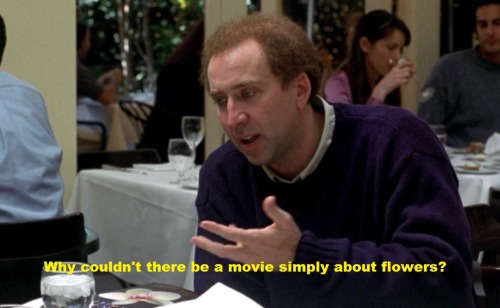
Adaptation is all around us, and is probably easiest seen at the movies. Many films were once books or short stories or poems. So, like Charlie Kaufman, a screen writer will decide what to leave in, what to write new, and what to forget about. I imagine the task is incredibly daunting, especially if one is working with a work that seems to have no proper narrative structure.
The other day I was talking with my pastor about which version of the Bible he uses to preach. One week he was gone, the text was a familiar one, but the default version for the slides was different from what everyone knew and what was in the pew Bibles. A member got in contact with my pastor after that week and was outraged that he wasn't using the "correct" version (what was in the pews). My pastor, as he does, remarked that all versions we read will be translations, because the Bible wasn't originally written in English--or even written at all! This blew the member's mind. He never thought about the Bible not being in English; about the Bible being translated and adapted for us.

Some scripture in Greek being translated to English picture from cwoznicki.com
I'm not even going to get into how many times and ways the Bible has been adapted into other media...
Adaptation is important.
It changes how we see, think about, a read a work. How we relate to it and talk to our friends about it. How we understand it.

This is a really interesting point. Faithfulness in adaptation is especially important in this case. I'm always fascinated by how different translations of the Bible can often say completely different things--which in turn changes how we understand Scripture and the conclusions we draw from it.
ReplyDeleteMe too, Jon! I always wonder what led the translators to pick those words over others.
DeleteI really like this perspective on adaptation. I think the significance of Biblical adaptation is something many, if not most, of us forget about, and yet it is probably one of the oldest forms of adaptation, and a very common one, as you pointed out. It is interesting that the church member you mentioned was so upset about the version being used being "incorrect," because I think that his reaction to a certain adaptation can be paralleled to our reactions of some of our favorite books and movies. For example, the two versions of "The Great Gatsby" we have been discussing have both been received by various people as either very good or very poor adaptations. Some people, if they like a version enough, might become defensive of their particular version. The same might be said of "Pride and Prejudice" or any movie for that matter. The fact that this person was so upset about an adaptation of scripture shows us how little has changed when it comes to trying to adapt something to appease a large number of people. It also makes me wonder how much meaning was lost thousands of years ago when the Bible was first "adapted" to be written down, as we have seen can happen between two different mediums, and then adapted again when it was translated into English.
ReplyDeleteYeah, I can see that parallel in reactions to adaptations/versions. Interesting thoughts.
Delete